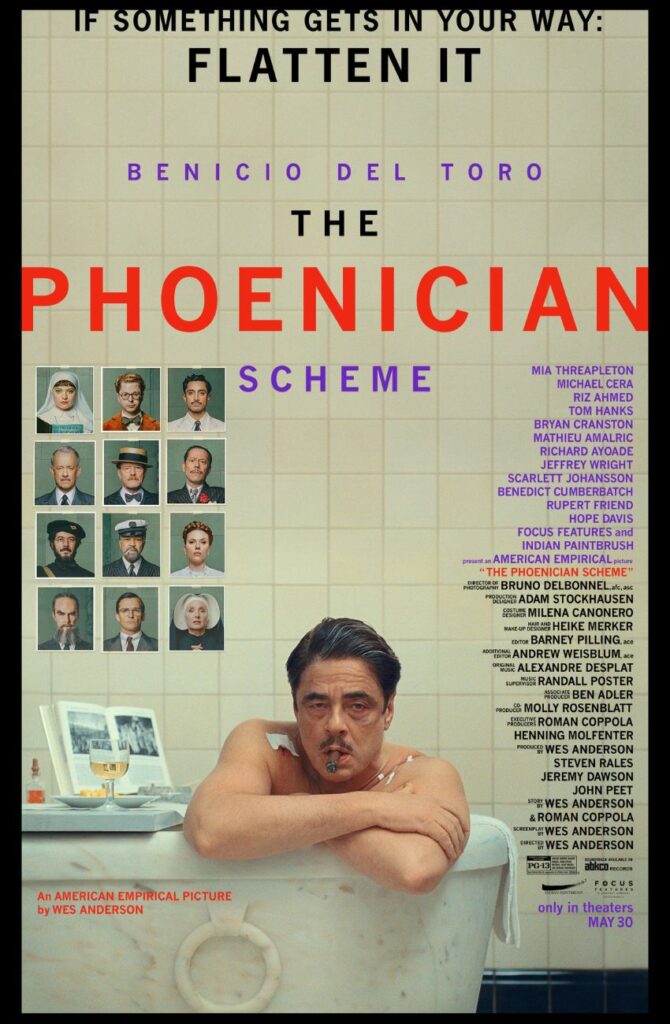
The Phoenician Scheme is a Minor Work on a Major Canvas
A minor entry in director Wes Anderson’s iconic canon is still cause for celebration.
Directed by Wes Anderson
by Prabhjot Bains
- Published on
Even a minor work from Wes Anderson is cause for celebration. Few filmmakers occupy such a revered space, carved out of an instantly recognizable style that immerses audiences in a foreign yet inviting world of vibrant hues, scrapbook iconography, and unfettered symmetry. With The Phoenician Scheme, Anderson doubles down on all the stylistic elements and pet themes he’s grappled with across his almost 30-year career, peering into the annals of family dysfunction, legacy, faith, and mortality with unscrupulous charm and wit.
Yet, despite arguably being Anderson’s most visually refined experience, The Phoenician Scheme marks a lateral move for the auteur, providing much of the same without ever developing or advancing his trademarked cinematic touch. As a result, this new outing not only finds Anderson at his funniest and most transportive, but also at his most emotionally stunted.
Taking place in the 1950s, in the fictional country of Phoenicia—a Middle Eastern analogue to The Grand Budapest Hotel’s Zubrowka—The Phoenician Scheme follows Zsa-Zsa Korda (Benicio del Toro), a multi-industry tycoon with a price on his head for a long chain of shady business practices. After narrowly surviving his latest assassination attempt, he reaches out to his daughter Liesl (Mia Threapleton), a postulant, to be his sole heir and aid him in his grand scheme to overhaul Phoenicia’s infrastructure while skimming profits for the next 150 years. Along with Bjorn (Michael Cera)—an entomologist and tutor, or so he says—Korda and Liesl travel the corners of greater Phoenicia to convince his business partners to cover the project’s funding gap.
Alongside his regular cinematographer, Bruno Delbonnel, Anderson crafts his most visually sumptuous and immersive world yet. Phoenicia’s sunbaked desert locales and cozy mid-century interiors all brim with meticulous detail and texture. From bird’s eye perspectives that absorb us in a room’s intricate tile design to encompassing wides that illuminate the majesty of a dusty train tunnel, The Phoenician Scheme finds Anderson’s famous obsession with models and miniatures at its most elegant and expansive. It’s flush with the kind of flourishes that make us forget its heavy-hitting cast, featuring the likes of Riz Ahmed, Tom Hanks, Scarlett Johansson, Benedict Cumberbatch, Bryan Cranston, Jeffrey Wright, and Richard Ayoade, to name a few.
While del Toro is in top form, it’s Cera’s nerdy Norwegian who steals the spotlight. He makes boundless use of Anderson’s tight, comedic timing and bevy of running gags—the best of which involves Korda repeatedly recognizing his would-be assassins as former employees. Cera’s natural, wonderfully attuned inflections feel ready-made for an Anderson project, making it all the more shocking that he’s never been in one until now.
Despite these star turns, it’s unfortunate that many other characters get short shrift, often relegated to mouthpieces that either spew exposition or hastily recount their backstories with glazed over visages. It’s a trend that has plagued other recent Anderson outings, but one that feels especially regressive and exhausting here, with inklings of personality and emotion being quickly snuffed by the demands of Anderson’s storybook feel and aesthetic.
As a result, The Phoenician Scheme feels more like a fun aside than a confident step forward. In many ways, Anderson’s vision feels trapped within the confines of the reputation he’s built for himself, stuck between adhering to the tenets of his iconic style and truly pushing the envelope. Many of the personalities that dot the film’s gorgeous tapestry feel lazily plucked from his growing oeuvre, while stale segues to a monochromatic afterlife within Korda’s mind manifest as trivial, almost desperate attempts to differentiate a tale that can easily be mistaken for a dozen of his other films.
While The Phoenician Scheme can be construed as a disappointment for some, as Anderson’s lens finally produces some diminishing returns and hints that his well is almost dry, it also reminds us why his work is such a bright spot on an increasingly drab and homogenous cinematic landscape.
The Phoenician Scheme is in theatres now

